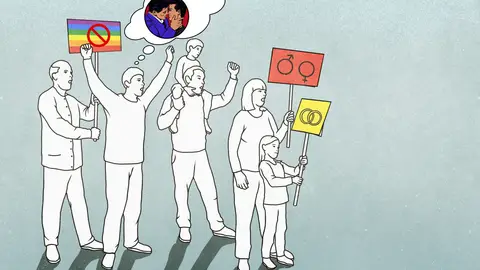Stop Calling Every Homophobe a Closet Case, You're Not Helping

Terry Haggard. Mark Foley. Larry Craig. Aaron Schock (allegedly). The history of closeted, anti-gay politicians and religious leaders is well-documented and is oft celebrated by those who wish to see our society move beyond homophobia.
The high-profile nature of these examples has helped the meme of the closeted self-hating, anti-gay bully performing homophobia in order to cover up their own secret orientation gain traction.
Its popularity is evidenced in countless comment sections whenever another self-identified straight man makes anti-LGBTQ comments.
The charge is not without support, as evidenced by the above list, for starters. It has been further fueled by an infamous 1996 study showing self-identified homophobic men became aroused by male-on-male erotic stimuli (read: gay porn), while their fellow straight-identifying counterparts who self-reported as not being homophobic showed no signs of arousal while viewing said material.
The study was conducted out of the University of Georgia using a small sample size of just 64 men, and its authors noted the difficulty of finding subjects who ranked in the "high-grade non-homophobic range," as well as the problematic nature of self-identification. They suggested including a behavioral element in determining the level of the subject's homophobia in future research, such as with a "fight or flight" response measurement, and also noted they had not tested homophobia in women.
That study was also conducted over two decades ago, and while anti-LGBTQ bias remains a serious problem, overall acceptance has increased, and younger people are identifying as LGBTQ at higher rates.
Yet the 1996 study is still too often cited as if it is standalone proof that "homophobia is gay."
A more recent study, published in 2012 in the Journal of Personality and Social Psychology, came to a similar conclusion, through a different methodology. 160 college students, which again represents a small sample size, were given tests to determine both their implicit and explicit biases against gay people, by asking participants how they felt about them, while also self-identifying their own orientation.
They were then shown words and pictures on a screen and asked to put them into "gay" or "straight" categories, ahead of which they were subliminally primed with the word "me" or "others," which was flashed on the screen for 35 milliseconds. Levels of homophobia were then tested, both by having participants fill out questionnaires and again through word association and subliminal priming.
Those participants in the study who identified as heterosexual, but showed a reaction pattern consistent with homosexuality, were more likely to express homophobic attitudes, the authors found. They also found a correlation with homophobic attitudes and having authoritarian parents.
Again, more research is needed, with the aforementioned small sample size and the researchers noting the imperfect nature of studying implicit bias, as well as noting that correlation does not prove causation.
What does seem fair to say is that there appears to be a strong correlation between homophobia and repressed homosexuality, and lived experience also backs up this finding. But to jump to the conclusion that someone who has a problem with queer people is in fact closeted will not only prove inaccurate at least some of the time, it carries with it concerning connotations, often dripping with the same homophobic undertones the speaker is ostensibly protesting against.
Too often there is an obvious underlying sense of gleeful mockery when these charges are made, as if to say, "Oh yeah? Well maybe you're one of the marked ones! Maybe you're a leper!"
There's some logic to this, in the way of shade, in that accusing someone of being that which they hate is a pretty surefire way to get under their skin. But it also, whether intended or not, carries with it the implication that that which you are accusing them of is something to be ashamed of in the first place. You are, in a sense, co-signing their homophobia, even if you're not aware that's what you're doing.
If being a member of the queer community is something to be proud of, or at the least not to be ashamed of, why are we casting it as an aspersion?
This is also bad strategy if the goal is to help rehabilitate the person so that they might come out of the closet and work towards our liberation as opposed to our subjugation. Shaming and ridiculing someone in hopes they come out and begin fighting on the right side of history is a losing battle.
The charge is even more irksome when it comes from straight "allies," as it so often does, most recently demonstrated by Patti LuPone and Marianne Williamson. While it would be quite a stretch to argue either one is homophobic, we could probably have done without their speculating.
And if the individual is in fact not secretly gay or bisexual, but is a cishet hater, calling them "one of us" is unlikely to be wise or productive, unless the goal is to draw an even bigger target on our backs. Poking at toxic masculinity by stoking its biggest fear—being considered effeminate in any way—is a recipe for disaster, and it won't be the straight "allies" who take the brunt of the abuse that comes with that backlash.
The idea that homophobia is nothing more than an inability to accept one's own true nature also discounts the influence of centuries of anti-LGBTQ religious doctrine, patriarchy, and a culture that routinely props it up.
While it is difficult to measure the percentage of queer people in the population, as a result of those who are in the closet, the prevalence of queerphobia in our society suggests not everyone who harbors these sentiments are themselves LGBTQ. Claiming otherwise is to claim queerphobia as solely an internal, LGBTQ problem, and the evidence is certainly not strong enough to draw such a definitive and broad conclusion.
The problem of homophobia, biphobia, and transphobia belongs to everyone, stop trying to make the queer community solely claim it.





